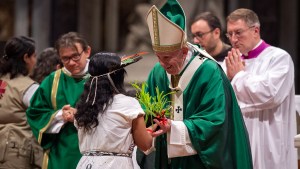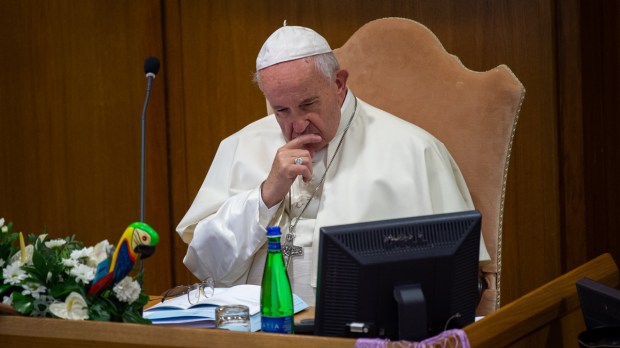Pope Francis was once a literature teacher and a former student recalls, “He used to quote writers easily from memory; it was fascinating. His presentations were also punctuated by numerous and varied references to painting, music, etc. He’s a multifaceted man.”
The Holy Father’s love for the beauty and communicative power of the written word, and particularly poetry, certainly shows forth in Querida Amazonia, his Post-Synodal apostolic exhortation released February 12. The document is unique — more than a synthesis of discussions and resolutions from the meeting of bishops, it’s an invitation to contemplate beauty … and what could be more apt given the subject matter is one of the most beautiful elements of God’s creation?

Read more:
6 Things to know about ‘Querida Amazonia’
Specifically, Pope Francis quotes as many as eight poems and other snippets of regional literature, and concludes the document with his own marvelous prayer to Our Lady.
Secular sources were quick to jump on the fact that the Holy Father did not green-light the ordination of married men to the priesthood, a point under consideration at the synod given the dire lack of priests in the region. Instead, he spoke of how important it is for priests to become more present in the Amazon, given that “the Eucharist ‘joins heaven and earth; it embraces and penetrates all creation.'” How, then, can we allow peoples to be deprived of the Eucharist for such long stretches of time?
He exhorts that “a way must be found to ensure this priestly ministry. The laity can proclaim God’s word, teach, organize communities, celebrate certain sacraments, seek different ways to express popular devotion and develop the multitude of gifts that the Spirit pours out in their midst. But they need the celebration of the Eucharist because it ‘makes the Church.'”
The pope presses bishops to encourage and foster a missionary zeal that would lead priests to take up the call to bring the sacraments to the Amazon. And in a footnote, he laments, “It is noteworthy that, in some countries of the Amazon Basin, more missionaries go to Europe or the United States than remain to assist their own Vicariates in the Amazon region.”
Let us awaken our God-given aesthetic and contemplative sense
But let us return to the Holy Father’s overall invitation in Querida Amazonia. It is somehow summed up in this paragraph: Let us weep for the Amazon, and cry to the Lord on behalf of the peoples there:
Let us awaken our God-given aesthetic and contemplative sense that so often we let languish. Let us remember that “if someone has not learned to stop and admire something beautiful, we should not be surprised if he or she treats everything as an object to be used and abused without scruple”.[75] On the other hand, if we enter into communion with the forest, our voices will easily blend with its own and become a prayer: “as we rest in the shade of an ancient eucalyptus, our prayer for light joins in the song of the eternal foliage”.[76] This interior conversion will enable us to weep for the Amazon region and to join in its cry to the Lord.
Pope Francis invites us to “stop and admire something beautiful” by using the words of the poets. To point out the abuse of the “colonizing interests” that work, notably, both legally and illegally:
“Many are the trees
where torture dwelt,
and vast are the forests
purchased with a thousand deaths”.[3]
“The timber merchants have members of parliament,
while our Amazonia has no one to defend her…
They exiled the parrots and the monkeys…
the chestnut harvests will never be the same”.[4]
The Holy Father praises the intense sense of community that characterizes the people of Amazonia:
“The morning star draws near,
the wings of the hummingbirds flutter;
my heart pounds louder than the cascade:
with your lips I will water the land
as the breeze softly blows among us”.[23]
He speaks of the “unique richness” and cultural identities of each of the peoples of the Amazon — there are over 110 indigenous peoples in voluntary isolation. He notes how the colonial period changed the locations of the peoples, driving them into the forest, and now to the outskirts of the cities:
“Once there was a countryside, with its river,
its animals, its clouds and its trees.
But sometimes, when the countryside, with its river and trees,
was nowhere to be seen,
those things had to spring up in the mind of a child”.[33]
“Make the river your blood…
Then plant yourself,
blossom and grow:
let your roots sink into the ground
forever and ever,
and then at last
become a canoe,
a skiff, a raft,
soil, a jug,
a farmhouse and a man”.[34]
Pope Francis spells out why he has chosen to interweave the document with poetry.
Poetry helps give voice to a painful sensation shared by many of us today. The inescapable truth is that, as things stand, this way of treating the Amazon territory spells the end for so much life, for so much beauty, even though people would like to keep thinking that nothing is happening: “Those who thought that the river was only a piece of rope, a plaything, were mistaken. The river is a thin vein on the face of the earth… The river is a cord enclosing animals and trees. If pulled too tight, the river could burst. It could burst and spatter our faces with water and blood”.[58]
Querida Amazonia adds much to the Church’s long history of reflection on cultures and the Gospel, noting how it is a process that enriches both the receiving culture and the Church:
On the one hand, a fruitful process takes place when the Gospel takes root in a given place, for “whenever a community receives the message of salvation, the Holy Spirit enriches its culture with the transforming power of the Gospel”.[92] On the other hand, the Church herself undergoes a process of reception that enriches her with the fruits of what the Spirit has already mysteriously sown in that culture. In this way, “the Holy Spirit adorns the Church, showing her new aspects of revelation and giving her a new face”.[93]
He adds:
Inculturation elevates and fulfills. Certainly, we should esteem the indigenous mysticism that sees the interconnection and interdependence of the whole of creation, the mysticism of gratuitousness that loves life as a gift, the mysticism of a sacred wonder before nature and all its forms of life.
At the same time, though, we are called to turn this relationship with God present in the cosmos into an increasingly personal relationship with a “Thou” who sustains our lives and wants to give them a meaning, a “Thou” who knows us and loves us:
“Shadows float from me, dead wood.
But the star is born without reproach
over the expert hands of this child,
that conquer the waters and the night.
It has to be enough for me to know
that you know me
completely, from before my days”.[104]
The document concludes with a prayer to Our Lady. Here is part of that prayer:
Mother of life,
in your maternal womb Jesus took flesh,
the Lord of all that exists.
Risen, he transfigured you by his light
and made you the Queen of all creation.
For that reason, we ask you, Mary, to reign
in the beating heart of Amazonia.
Show yourself the Mother of all creatures,
in the beauty of the flowers, the rivers,
the great river that courses through it
and all the life pulsing in its forests.
Tenderly care for this explosion of beauty.
Ask Jesus to pour out all his love
on the men and women who dwell there,
that they may know how to appreciate and care for it.
Bring your Son to birth in their hearts,
so that he can shine forth in the Amazon region,
in its peoples and in its cultures,
by the light of his word,
by his consoling love,
by his message of fraternity and justice.
And at every Eucharist,
may all this awe and wonder be lifted up
to the glory of the Father.

